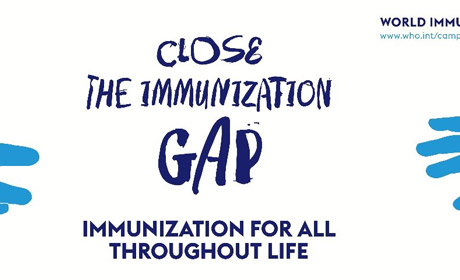World Immunization Week 2016
26/4/16
World Immunization Week: Close the gap
1.5 million children under the age of five die every year in the world’s poorest countries from vaccine-preventable diseases. The World Health Organization estimates that 18.7 million children worldwide have yet to receive basic vaccines to stop diseases such as whooping cough, tetanus and diphtheria.
Irish Aid supports GAVI, the Vaccine Alliance, to save children’s lives and protect people’s health by increasing access to immunization in poor countries. Since 2000, GAVI has contributed to the immunization of an extra 500 million children worldwide, and helped to prevent more than 7 million deaths in developing countries.
Irish Aid also supports research into the development of new vaccines. The International AIDS Vaccine Alliance, the Medicines for Malaria Venture and the European Vaccine Initiative, with Irish Aid support, are all working to find vaccines against diseases such as HIV/AIDS, malaria, and TB. Vaccines for these diseases are vital if we are to end these epidemics and it is important that research continue towards producing safe, effective vaccines in the future.
Immunization is one of the most cost effective investments in health
Polio is a highly infectious disease that was common worldwide until recently, with the last outbreak in Ireland in the 1950s. Children are most at risk of polio, and it can cause total paralysis. In 1988, the Global Polio Eradication Initiative (GPEI) was launched, and since then, the number of reported cases of polio has dropped from 350,000 to just 74 in 2015. Today, polio remains widespread in only two countries – Pakistan and Afghanistan. Irish Aid supports the work of GPEI in their efforts to make sure that polio becomes a disease of the past.
Thanks to immunizations through vaccines, an estimated 3 million people are saved each year from dying due to preventable diseases. In this context, it is important for every country to have immunization as a routine part of their health system. Between 2000 and 2013, the measles vaccine prevented the deaths of nearly 15.6 million people worldwide and resulted in a 67% decrease in measles cases.
Immunization is one of the most cost effective investments in health. For every $1 spent on vaccinations, $16 is saved on healthcare costs, loss of earnings, and transport costs. Immunization has played a large part in the 50% reduction in the rate of child deaths since 1990. The UN Sustainable Development Goals agreed by the world’s nations in September 2015 call for national vaccination targets at the level of 90%.
Find out more about GAVI, the vaccine alliance

